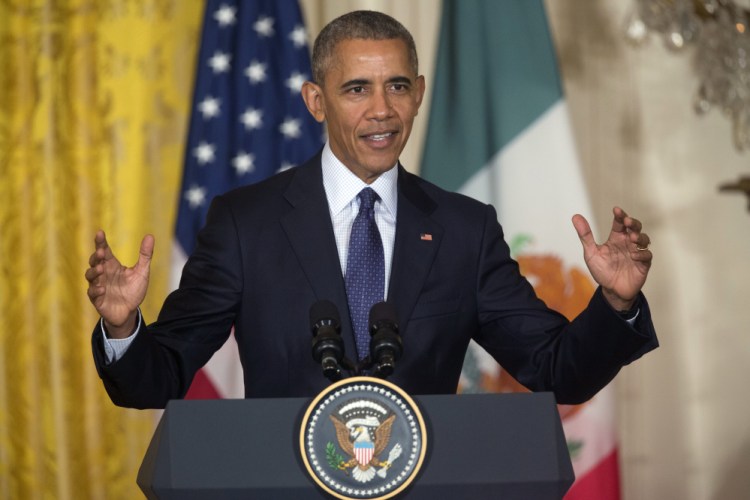PHILADELPHIA — Barack Obama sweeps into the Democratic National Convention Wednesday with an opportunity no president has had in nearly three decades: to help his chosen successor.
And make no mistake about it, Hillary Clinton needs his help.
She struggles with getting voters to like her, recent polls show she’s vulnerable against Republican Donald Trump, and more than a few Democrats attending their national convention still prefer her primary season rival, Bernie Sanders.
Clinton has embraced Obama, saying she wants to build on his vision – a marked difference from past years when presidential hopefuls have run away from their party’s presidents because of personality clashes or low approval ratings.
It is the first time since 1988 that an outgoing president has been popular enough to help and the first time a president’s party has nominated someone who genuinely wanted the help.
“A president’s popularity always helps someone running for his party in a presidential year,” said Ken Duberstein, who served as Reagan’s chief of staff in his second term.
Obama will not help Clinton win over Republicans or conservative-leaning independents, but, political experts say, he can help bring Sanders’ supporters on board and persuade Democrats to get to the polls in November.
“A president is never going to be extremely popular in this age of polarization,” said George Edwards, a presidential scholar at Texas A&M University. “You can only go so far.”
This year, Clinton and Trump are running close, sparring in a race in which both sides have already engaged in name-calling. Obama endorsed his former secretary of state near the end of the caucuses and primaries, calling her possibly the most qualified person ever to run for the White House.
The timing for Clinton couldn’t be better.
Obama’s approval ratings are higher than they have been since the start of his presidency, according to a recent McClatchy-Marist Poll. Meanwhile, Clinton’s come in 15 percentage points less at 36 percent.
The economy has improved, with more Americans returning to work after the Great Recession. And Obama has had a productive stretch in the last year, from opening diplomatic relations to Cuba to striking an international agreement on climate change.
And he’s taking on a decidedly more blunt tone as he enters the final phase of his presidency, both feeling the freedom that comes from running your last race and seeing your first child grow up and move out of the house.
“He seems happier. He seems looser,” said Barbara Perry, director of presidential studies at the University of Virginia Miller Center. “It’s like a kid coming up to summer vacation.”
Make no mistake about it, Obama is not holding back when it comes to Trump, whose outspoken rhetoric and policies are visibly getting under his skin.
“He feels personally clear. That’s a change,” said Lee Miringoff, the director of the Marist Institute for Public Opinion in New York. “He’s not reluctant to be in the mix.”
Obama has blasted Trump for abandoning American ideals and painting an exaggeratedly darker view of the situation in the United States.
“Anybody can tweet, but nobody actually knows what it takes to do the job until you’ve actually sat behind the desk,” he said at his first campaign appearance with Clinton.
White House press secretary Josh Earnest often says Obama is “relishing” hitting the campaign trail and speaking out about Trump.
“This actually puts the president in a relatively unique place in our history,” Earnest said. “It’s been at least a generation, if not longer, since you had a two-term president in his final year in office in demand by party leaders, including by the party nominee, on the campaign trail.”
George W. Bush left office with a 34 percent approval rating, according to the American Presidency Project, making him toxic on the campaign trail.
Bill Clinton left office with a 66 percent approval rating despite his impeachment, but personality conflicts prevented Democrat Al Gore from asking for his help.
George H.W. Bush had a 56 percent approval rating even though he lost his re-election. Reagan was at 63 percent.
Just two years ago, Obama’s approval rating dropped to 40 percent before the midterm elections, and candidates did not want to appear on the campaign trail with him. His numbers improved this year, in part because Clinton and Trump are so unpopular.
Fifty-one percent of registered voters say they approve of the job Obama is doing as president, while 43 percent disapprove.
Political observers warn that Obama shouldn’t get too involved in the race because it could be perceived as indicating Clinton is desperate for his help or that the president is not doing his own important day job, and that could lead to a drop in polls.
They add that Obama should deliver an impassioned speech at the convention, campaign with Clinton and raise money for her, but not meddle in the day-to-day affairs of campaign strategy.
“She has to separate herself in a meaningful way,” said Ken Mayer, a political science professor at the University of Wisconsin-Madison who studies the presidency. “You walk a very fine line.”
Send questions/comments to the editors.



Success. Please wait for the page to reload. If the page does not reload within 5 seconds, please refresh the page.
Enter your email and password to access comments.
Hi, to comment on stories you must . This profile is in addition to your subscription and website login.
Already have a commenting profile? .
Invalid username/password.
Please check your email to confirm and complete your registration.
Only subscribers are eligible to post comments. Please subscribe or login first for digital access. Here’s why.
Use the form below to reset your password. When you've submitted your account email, we will send an email with a reset code.